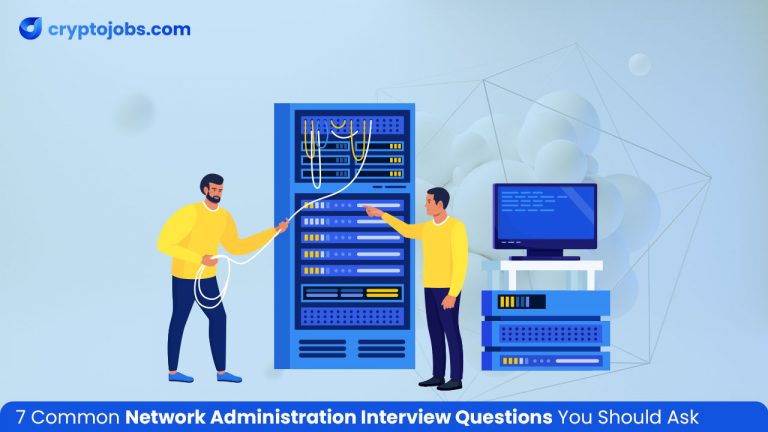
7 Common Network Administration Interview Questions You Should Ask
- cryptojobs.com
- March 26, 2024
- Interview Questions
- hiring
- 0 Comments
As technology advances rapidly, the role of a Web3 network administrator becomes increasingly crucial. The need for qualified network specialists is rising as Web3 businesses struggle to manage the challenges of digital transformation. Interviews are crucial steps in leveraging your experience and knowledge of the industry to select the most qualified applicant for the position, regardless of whether you are an experienced recruiter or just starting in the network administrator job recruitment.
In this article, we will look at seven common network administration interview questions, which are meant to give hiring managers important information about the candidate’s abilities. These inquiries probe into the applicant’s backgrounds, problem-solving methods, and comprehension of important Web3 network management ideas. Here are these interview questions to help you out.
Check out: 6 Key Skills Recruiters Should Look for in Network Administrators
An effective response would start with a careful examination of the goals and needs of the organization. This includes evaluating the security concerns, scalability requirements, and current network architecture.
The candidate would next create a thorough network design plan that included IP addressing methods, VLAN configurations, hardware and software needs, and network segmentation. Adherence to industry best practices and stringent testing methods guarantees seamless integration and peak performance during the deployment process.
The best candidates should be those who can demonstrate a thorough grasp of access control approaches, such as network segmentation, role-based access control (RBAC), and authentication protocols.
An ideal response would mention implementing strong authentication methods to verify user identities, such as RADIUS or TACACS+. Furthermore, applicants must show they can use RBAC to give user roles and permissions per job duties.
Implementing efficient network segmentation techniques, such as dividing departments or user groups into their VLANs or subnets, is also crucial. Routine audits and monitoring tools are essential to confirm the effectiveness of access restrictions and identify unauthorized access attempts.
Look for applicants who understand the value of documentation in network management and have plans to ensure that it remains accurate.
A good method is to draw detailed network diagrams that include IP address allocations, device setups, VLAN mappings, and network topology. Applicants should stress that they will update documentation as soon as possible after any network changes, such as extensions, hardware upgrades, or configuration changes. Using documentation management systems also makes organizing and storing information centrally easier, encouraging easy access and teamwork.
Recounting an instance where the applicant experienced a major network outage during a crucial business function might be a compelling response. They would explain how they started the troubleshooting process immediately, using a methodical strategy that included obtaining relevant data, analyzing the network, and carrying out specific tests.
Throughout the process, the applicant would highlight how well they were able to stay in constant, proactive communication with the team, giving frequent updates on developments and possible resolutions. Ultimately, the applicant would emphasize their capacity to reduce downtime and efficiently mitigate business damage by quickly determining and fixing the core source of the problem.
A solid response would be to give an example of a project where careful resource allocation was required due to budgetary limits. The applicant may talk about their methodology, which included conducting an in-depth investigation to find economical substitutes without sacrificing security or performance.
They would strongly emphasize their study of future growth estimates and network requirements, which would allow them to prioritize upgrading essential components while making the most use of already-existing infrastructure. The applicant may also emphasize their attempts to explore open-source alternatives for particular network functions and bargain with suppliers for affordable prices.
A compelling answer would highlight the candidate’s commitment to creating solid bonds between people that are based on respect and good communication. They would talk about how they actively engaged with cybersecurity experts, system administrators, and other relevant teams by attending cross-functional meetings, exchanging information and skills, and getting feedback on choices of networks.
Through cultivating a cooperative atmosphere, the applicant would demonstrate their dedication to working together to overcome obstacles, exchange best practices, and get the greatest results.
Candidates who stress the value of feedback as a chance for development and advancement should be prioritized. When getting comments or criticism, they would explain their strategy as keeping an open mind and carefully listening to comprehend the viewpoints expressed.
The applicant can discuss how they routinely probe for clarification to get more information and pinpoint areas needing development. After that, they would talk about how they considered the criticism, assessed its integrity, and made the necessary adjustments to integrate it into their network management tasks. Accepting criticism helps the applicant develop their abilities over time and fosters a culture of continual growth within the organization.
Are you prepared to advance your team’s network administration to a new level? Then, reach out to our large pool of competent applicants who have what it takes to succeed in network management positions in the Web3 ecosystem. cryptojobs.com can help you find people for entry-level jobs or experienced specialists to drive your network infrastructure endeavors.




